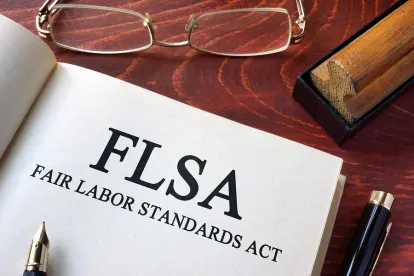If you are a sports fan, then you might consider the regulatory agenda of the U.S. Department of Labor (DOL) in general, and the Wage and Hour Division (WHD) in particular, as winding down to the end of the third quarter of a football game or moving into the latter innings of a baseball game. In both sports, time and opportunity become critical for the team that wants to win but is not ahead. Regardless of your preferred game, as the November 3, 2020, elections draw closer (less than 440 days away), the WHD has been very busy in the regulatory realm under Wage and Hour Administrator Cheryl Stanton and Acting Secretary of Labor Patrick Pizzella.
Currently, the WHD has three proposals for review by the Office of Information and Regulatory Affairs (OIRA) of the Office of Management and Budget.
Revisions to White-Collar Overtime Exemption Rules
First and foremost is the proposed overtime rule that OIRA received on August 12, 2019. This rulemaking dates back to the last administration and its unsuccessful efforts to update the salary level tests for the executive, administrative, and professional exemptions of Section 13(a)(1) of the Fair Labor Standards Act (FLSA). After litigation successfully challenged the 2016 final rule, the Trump administration engaged in extensive rulemaking to revise the salary level tests and (to continue the baseball analogy) is one out away from finalizing a new, more reasonable amount. Once OIRA approves it and it is published in the Federal Register, it will go into effect either 60 or 90 days after publication or late this year or early next year at the latest.
Reforms to Tip Regulations
Second, WHD submitted a notice of proposed rulemaking (NPRM) to revise the tip regulations in light of the amendments to Section 3(m) of the Fair Labor Standards Act (FLSA), which Congress passed last year. OIRA received this NPRM on July 26, 2019. This rulemaking hopefully addresses the amendment to the FLSA that Congress passed in the Consolidated Appropriations Act of 2018 in March 2018. Congress intervened in a dispute over tipping practices where an employer did not take a tip credit and amended Section 3(m) of the FLSA to address certain issues involving tips, tip pools and the tip credit. Bottom line, Congress took the following actions:
-
Clarified that tips are the property of tipped employees and an employer may not keep any tips of its tipped employees
-
Clarified that managers or supervisors cannot share in any tip-pooling arrangement or keep any portion of employee tips
-
Nullified regulations prohibiting a tip-pooling arrangement that requires tips be shared among tipped employees and nontipped employees such as cooks and dishwashers where an employer does not take a tip credit
The effect of this amendment is also to leave unchanged the existing rules on tip-pooling arrangements where an employer does take a tip credit in that tips can be shared only with or among tipped employees. To provide guidance to the regulated community, WHD issued Field Assistance Bulletin No. 2018-3 on April 6, 2018, in which it laid out its interpretation and enforcement policy in light of the amendment. While it is not known at this time, it is possible that this NPRM could also address WHD’s dual jobs regulation and its November 8, 2018, interpretation in Opinion Letter FLSA2018-27.
Modifications to Fluctuating Workweek Regulations
The third development occurred on August 15, 2019, when OIRA received an NPRM from the WHD to revise the fluctuating workweek regulation found in Section 778.114. This rulemaking stems from an uncompleted effort in the last year or so of the George W. Bush administration to revise the regulations. Instead, the Obama administration completed the rulemaking, finalizing a rule that differed from the proposal and limiting the ability of employers to use the fluctuating workweek methodology to comply with the overtime requirement of the FLSA.
In addition, the WHD is reviewing comments submitted on two other significant proposed rulemakings. One NPRM is on the regular rate determination under the FLSA in Part 778 of Title 29 of the Code of Federal Regulations; its comment period closed June 12, 2019, after an extension from its May 28, 2019, original closure date. The other NPRM addresses joint-employer status under the FLSA, as defined in Part 791. The comment period for it closed on June 25, 2019, after an extension from the original closure date of June 10, 2019.
These regulatory initiatives are also important because they purport to update interpretive guidance that has not been addressed in decades. For example, the regular rate regulations have not undergone a comprehensive revision since 1968, while the joint-employer regulation has not been revised since 1958.
All these items are on WHD’s most recent regulatory agenda, so it promises to be a busy fall in the wage and hour space and a strenuous sprint to the November 3, 2020, elections.




 />i
/>i
